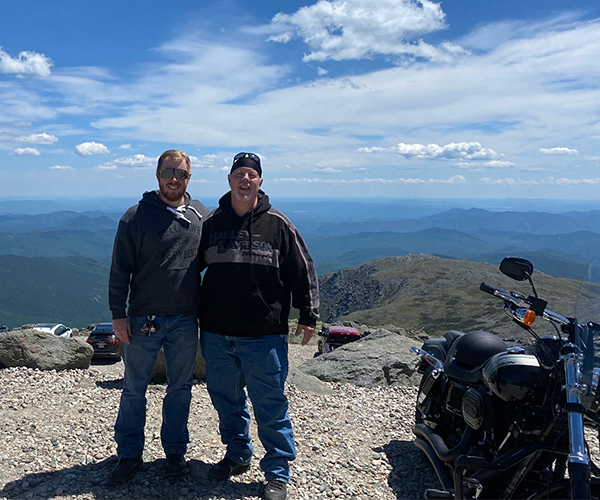Colameco’s harrowing experience began after a family vacation in early November with his wife, Ginny, and his and her adult children and daughter-in-law. They planned a very cautious Las Vegas trip and thought they did everything right. They arranged for small dinners in separate and distanced areas of the restaurant, rode their motorcycles to isolated places, and stayed away from casinos and crowds.
However, shortly after they got home, Ginny fell ill. A COVID test revealed she had the virus.
Colameco felt no symptoms at that point, “but I knew I had been sleeping with the enemy,” he says with a laugh. His wife had a mild case and recovered in a few days. Just as she was getting better, Colameco started feeling the effects.
“I’m getting chills, perspiring, coughing… This was a Monday, and I thought it would pass by Friday,” he says. But on Friday his wife heard a thud and found him passed out on the floor of the shower.
An ambulance rushed him to the community hospital near his home where they tested him for COVID and diagnosed him as “dehydrated.”
By Saturday morning, Colameco still hadn’t gotten test results or any medical treatment. His heart rate was elevated and rising, and his oxygen level had dipped to 87, but he was not put on supplemental oxygen. He still hadn’t seen a doctor, and was told his COVID test results wouldn’t be back until the beginning of the week.
“I felt things were not going in the right direction,” he says. When he asked to be taken to another hospital, the doctors refused, saying he wasn’t stable enough for an ambulance ride.
As their concern rose, he and his wife discussed options. They knew he needed to be transferred to Jefferson, where they have been longtime benefactors and active in fundraising.
Colameco became involved with the hospital during his first wife’s battle with breast cancer. The couple created the Barbara A. Colameco Cancer Transportation Fund that helps secure rides to and from chemotherapy, radiation, and medical appointments for patients who need them. Barbara passed away in 2010; the family continues to support the effort through fundraisers, and also lends their time, energy, and gifts to other endeavors at the hospital.
Ginny decided to contact Jefferson to ask for assistance.
She was told “the JeffSTAT team would arrive at the hospital at 11:20 for transport to Jefferson,” Colameco says. “Well, at 11:20, that chopper landed and it was like the Army arrived. A relief came over me. They loaded me in and 12 minutes and 20 seconds later I was landing on the roof at Jefferson.”
The medical team immediately took chest X-rays and did tests that revealed he had COVID, as well as bacterial and viral pneumonia. They began treatment right away. There were ups and downs over the course of 10 days as the virus ebbed for a while, then came roaring back, but Colameco says his team was on top of everything. As he improved, a lingering side effect—a dangerously elevated heart rate—had to be corrected with an ablation procedure, extending his hospital stay a few more days.
Although Ginny was unable to visit because of COVID protocols, she talked to her husband on the phone and received regular updates from the nurses. Colameco says those same nurses gave him outstanding care, even taking the time to sit and chat with him when the floor was quiet in the early hours of the morning.
“I give those Jefferson nurses an A-plus,” he says.

